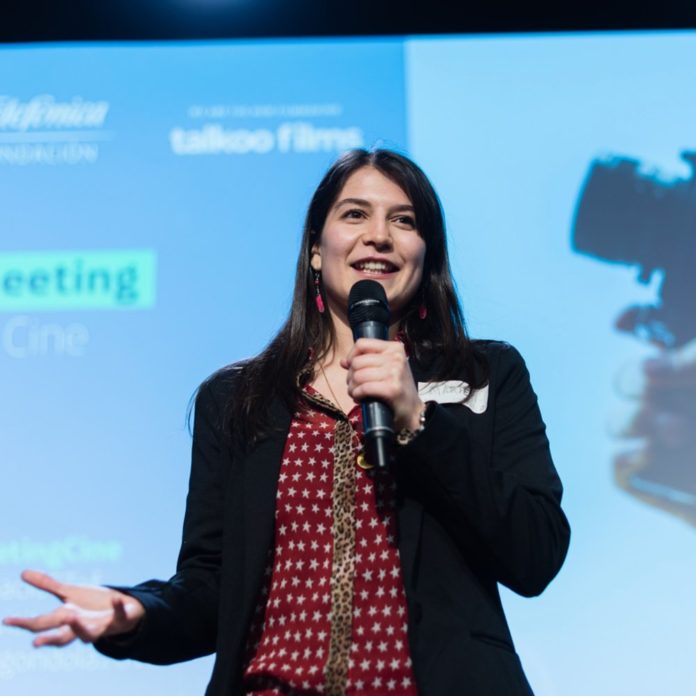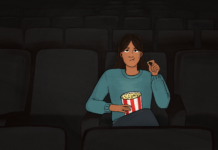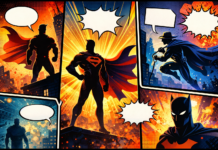Marieta was born in Madrid, Spain, where she is currently based. When she was 9 years old she spent a year in California, where she learnt English. She later returned to study in the United States having received the ASSIST scholarship to attend The Lawrenceville School when she was 17.
As a producer, Marieta has worked supporting online content creators and film directors. La Vieja, a short film by youtuber Rush Smith that she produced, currently has over 5 million views on the platform. She became interested in the digital audiences and started a YouTube channel in English called “Eigengrau where she shares Making of content about her projects. Marieta also hosts the Meeting de cine, a filmmaker’s gathering in Spain to share projects, resources and contacts. She has also written (yet to be published) her first book “Instinto Cineasta” that can be translated as “Filmmaker’s Instinct” where she gathers the experience of her first 5 years starting out in the industry in the Spanish context, so that other filmmakers can learn how to build their own community, find resources to shoot, and avoid being tricked in their first steps in the professional world.
Exclusive Interview with Filmmaker Marieta Caballero
NY Glam: Congratulations on being accepted at the prestigious International Filmmaker Festival of New York. Can you tell us about the film and the process of making it?
Emotional Disease is a story that taunts its viewers into thinking about one question: can emotions be considered a disease and why?
The fine line between healthy and sick is blurry, as it’s the collective imaginary who dictates how the concept is used and to what it is applied to. In different times and in different cultures, sick is attributed to different things. In a society where productivity and economic growth seems to be the goal, are emotions a liability? If so, should they be treated as a disease? Parting from this concept, the story of Indigo and Atlas came to life.
The film took a year to make. I wrote the screenplay in 3 days, but it wasn’t until many months later, preparing the crowdfunding campaign, that I achieved the 3000€ necessary to make the film, thanks to 66 backers. Then it took about a month to preproduce, a 3 day shoot, and many many months of postproduction to complete.
NY Glam: How did you go about casting for the film?
This is actually an interesting story. The moment I wrote Emotional Disease, I knew it wasn’t going to be easy to make a short film in English in Madrid, as I would have less actors to choose from. I was lucky that Madrid is a very cosmopolitan city, with people coming and going from many places. For the male part, I put together auditions and when I saw Cai Peña, I knew he would be the one to play Atlas. But for Simone Gonzalez-Nagy, it was a very different case. Two weeks into looking for actors, all the actresses whose video books I was receiving didn’t convince me. I walked into a Starbucks to have coffee and I saw her. I thought: wow, she really resembles the character I have in mind. She did look as a foreigner who would probably speak English, but I didn’t believe in the phantastical Hollywood stories about how a director discovered an actor in the street. Yet I was so moved and motivated by finding my character that I went to talk to her. She turned out to be from the United States and accepted to audition for me. She sent me the best tape, and in the auditions she was by far the best actress for the part. It was pure coincidence, but I am very lucky to have had Simone play Indigo in Emotional Disease.
NY Glam: What is the story about and how did you achieve it cinematically?
Thirty years into the future, technology has evolved up to a point where uncertainty isn’t an option. The only thing perturbing uncertainty are human emotions, and are, hereafter, taken to be a contagious disease to be eradicated.
This is the story about a couple, Indigo and Atlas.
What Indigo doesn’t
know is that Atlas is infected by the Emotional Disease, in a personal struggle
to conceal his symptoms.
Watch the trailer here: https://www.youtube.com/watch?v=Fv_awrprbj4
Cinematically I decided not to take part in defending one of the characters more than the other. Both main characters are deep and have their own processes, yet they both live under the pressure of society suffering from two different standpoints. With this approach, I let the audience judge upon themselves.
NY Glam: Will you be attending the IFFNY festival in New York in May?
Unfortunately I cannot, since I’ll be attending another important personal commitment during the same dates. But probably the actress Simone González-Nagy, playing Indigo, will attend. I can’t confirm for sure, though.
NY Glam: How long have you been making films and videos?
I didn’t’t start out very young, because my family didn’t’t own a video camera nor wanted to, nor a phone with a camera. When I was 13, I saved 100€ to buy a small film camera that cam with a newspaper promotion. Although the camera had a really really bad quality (I don’t think it could even shoot in HD), it motivated me to write a TV series and shoot the first two episodes with my friend Allie Premzic. It was very hard to do so because I had no one else to make it with, so we had to put effort into convincing my siblings to participate and keep them happy in doing so. A year later I wrote a feature film with Allie. It was an 80 page screenplay in English. Since Allie lived in California, and I lived in Spain, we only had a time span of 1 month in the summer to shoot the whole film. The project was never completad, but since then we had a good camera, I began to wonder why it was that it didn’t look cinematic. I learned then what a shot is, since back then the only cuts in the movie would be from scenario to scenario.
But it was after taking a 2 week summer workshop for teens at the ECAM film school that I really began to see progress, a starting point in my career. There, I met 5 other friends with whom I created a production association called Tuelf Productions. At 16, we didn’t’t know any other people at our age shooting shorts, and after many shorts, we got recognition in our community the moment any other young aspiring filmmaker like us saw us work together and what we were achieving. We got many awards since our shorts were much better quality by far when compared to the rest in one of the only short film festivals in Spain for filmmakers and students under 18. With this we realized of our potential, and I think a lot of what I do and lots of the people I work with today are thanks to the collective effort we put into Tuelf learning and filming together.
NY Glam: What film was your directorial debut?
During the two years that I was actively making shorts with Tuelf, it served as a hands on film school. The first short that I directed on my own was called “Discover Your Place in the World”, but it was more like a test for myself than anything else. I consider to be my directorial debut “The Collection,” because it resembles much more the workflow that I follow today, and the money invested and for the awards it achieved.
The Collection was a short film inspired by a feature film with the same name that I wrote. It showed the story about a group of teenagers living under a totalitarian regime where culture is prohibited. One day, thanks to their curiosity and their teacher, they discover a hidden basement where books, art, musical instrument, and other special things lay hidden, until they find them. This leads them to the question of whether they should hide it and forget about it, or secretly share their discovery despite the risk of getting killed.
NY Glam: What was the most important lesson you had to learn that has had a positive effect on your film? How did that lesson happen?
Don’t try to please anyone when filming, trust your gut. Otherwise you’ll be dissolved as a director because of trying to incorporate everybody’s opinion. But defend your vision, you need to gain the respect and confidence of your crew. So I’d say primarily, choose a good team that you feel comfortable with if you can.
When I was starting out, I was less experienced, so I had less resources to defend my views when a crew member didn’t want to listen to me as a director. As it might still happen to me today, I know have resources to stop such attitude. Even so, I try to work with people whom I feel comfortable with, as to avoid this happening.
Also, finish your projects, even if you think they’re not good enough. It’s always better to have something to show than nothing to show, even if it’s not as good as you’d hope for. Finishing is important. And when you go back to watching them years later, you’ll be glad you did.
NY Glam: Is it harder to get started or to keep going? What was the particular thing that you had to conquer to do either?
To me the hardest has been to get started. At first no one believed in me. I think it’s much easier if you have support from friends and family, which wasn’t my case. I first had to show them that I could do it. Despite the painful experience of directing Discover your place in the world, it was worth it because it got my family to support me after seeing the result.
Once I started out, to keep going was easier because I made sure to become surrounded with a community of filmmakers to help each other. It is called Meeting de Cine. It is now easy for me to find the resources to make my shorts with many resources spending little money. If I need more money, I also know how to find it now.
NY Glam: How has your style evolved?
I think it’s too early to see how my style has evolved. I have improved the technical aspects, but the stories I like to talk about still revolve the same aspects: how society shapes our conception of what reality is, and how to deal with it, for the most part.
NY Glam: What has been your personal key to success?
Creating a community of filmmakers to help each other.
NY Glam: What are you thinking about doing next?
I would like to write, direct and produce branded content films. I already have experience in it, and have discovered I want to do it more.
I am also going to publish a book called Instinto Cineasta www.instintocineasta.com which is a guide for filmmakers to jumpstart their careers with advice that you don’t learn in film school.
NY Glam: Where does your studio want to go from here?
My studio is Talkoo Films. It is a production company aimed towards content creation for the digital audiences: branded content, short promotional videos for social networks, commercials, etc. You can learn more at www.talkoofilms.com Our goal is to grow our company to be able to produce fictional feature films.
Marieta’s social networks:
Personal website: www.instintocineasta.com
Instagram: @marietaeigengrau
Twitter: @marieta_caba
Facebook: www.fb.com/instintocineasta
Views: 433







